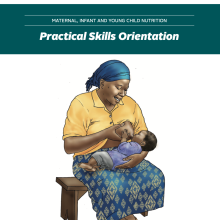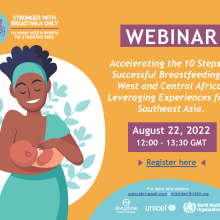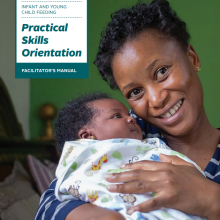Journal article
Jan 08 2024

Bridging the evidence-to-action gap: enhancing alignment of national nutrition strategies in Cambodia, Laos, and Vietnam with global and regional recommendations (Nguyen TT, Huynh NL, et al. Frontiers in Nutrition. 2024)
This journal article details Alive & Thrive’s examination of the alignment of recent National Nutrition Strategies and Action Plans (NNS) in Cambodia, Laos, and Vietnam with recent global and regional recommendations and standards with a focus on maternal, infant, and young child nutrition an
Guide/Manual
Aug 16 2023

Alive & Thrive Nigeria MIYCN Practical Skills Training Manual
This manual can be used as part of an in-service orientation/training for newly employed or deployed health professionals working in MIYCN. It can also be used to train existing primary healthcare (PHC) workers on essential MIYCN services that can be integrated into PHC services.
Announcement
Aug 01 2022

WEBINAR: Accelerating the 10 Steps to Successful Breastfeeding in West and Central Africa. Leveraging Experiences from Southeast Asia
The Stronger with Breastmilk Only regional initiative, a collaboration of UNICEF, WHO and Alive & Thrive, is pleased to invite stakeholders to a 90-minute webinar on August 22 at 12:00 GMT to discuss how to accelera
Journal article
Oct 08 2020

Trends and inequalities in the nutritional status of adolescent girls and adult women in sub-Saharan Africa since 2000: a cross-sectional series study (BMJ Global Health, 2020)
Guide/Manual
Jan 08 2020

IYCF Practical Skills Orientation - Facilitators' Manual
The IYCF Practical Skills Orientation Facilitators' Manual is suitable for health staff including birth attendants, ANC providers, facility In-Charges and service providers who are in contact with pregnant women, mothers in delivery rooms and their newborn infants, mothers of children 0-6 months
Brief
Oct 23 2018

Nigeria nutrition profiles
Nigeria has recently made progress toward strengthening policies and programs in support of maternal, infant and young child nutrition (MIYCN). However, progress has been limited to specific states—and creating strong plans for implementation of new policies remains a challenge.

